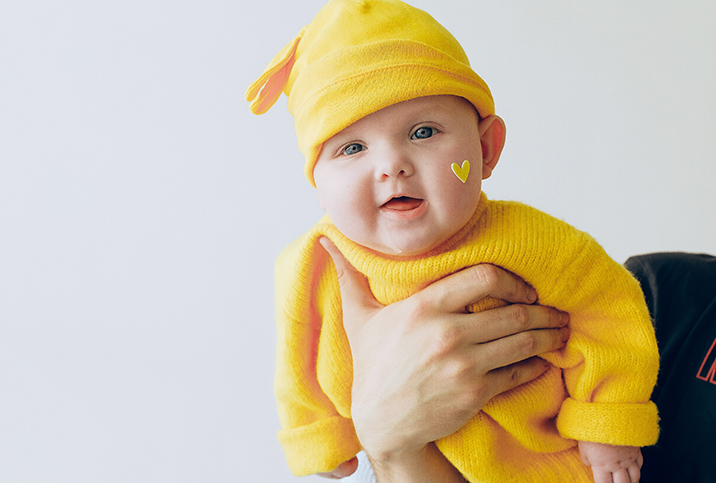How To Tell Your Partner Your Biological Clock Is Ticking

Both men and women are susceptible to the effects of aging on fertility. Although many people prefer to wait until later in life to start a family, getting pregnant without assistance typically gets more challenging for women every year after they hit the big 3-0.
Between ages 20 and 30, most women have a 25 percent chance of pregnancy per ovulation cycle, according to the American College of Obstetricians and Gynecologists. Once reaching 40, the likelihood of conception goes down to 10 percent, and by age 45, it's pretty uncommon for women to become pregnant naturally.
If you’re a woman who knows that kids are part of your life plan, it's in your best interest to start trying before you reach your mid-30s—35 is often cited as the age women’s fertility starts to significantly drop off, but a recent study published in the Journal of the American Medical Association found their mean reproductive life span has increased from 35 to 37.1 years.
Whether you’ve never discussed your burning desire to reproduce before or you’ve done a one-eighty on a previous decision to wait, it’s important to broach your concerns about your biological clock with your partner sooner rather than later.
Before you do that, however, it’s good to be clear about where your sense of urgency is coming from. Increasing age is a sound reason to make conception a more pressing priority, but it shouldn't be your only consideration when deciding to start a family.
Having children is a huge commitment that requires significant lifestyle changes, so before you raise the topic with your partner, give some thought to the following issues:
- Do you feel mentally, emotionally and physically ready to become pregnant?
- How do you see a child impacting your career? Do you have medical leave available through your employer?
- What are your plans for childcare?
- Who are the people you want to be involved in your child's life?
- Will you need to move to a bigger home or a new location?
- If you can't get pregnant, would you consider IVF or adoption?
There's no way to anticipate all of the possible twists and turns that can come with becoming a parent, but getting a basic picture of your hopes and expectations will make it easier to have a productive conversation with your partner and to establish whether you’re broadly on the same page.
If you’re worried about your ability to conceive as time marches on, be explicit with your partner about the biological realities you’re up against.
Unless you plan to do it alone, you’ll also need to evaluate whether your relationship will provide a solid foundation for your growing family. If you or your partner struggle with substance abuse, domestic violence, anger management or severe medical concerns, you'll need to be honest with yourself about the impact on everyone involved. Although no relationship is perfect, making sure you can meet your child's basic needs is essential, so consider whether you might need to take time to treat health issues, resolve serious relationship problems (if possible) and secure a basic standard of living before trying to conceive.
Once you’ve established that you want to have kids with your partner soon, it’s time to broach the subject with them. Discussing your family plan can be emotionally charged, especially if it’s the first time you’ve had this discussion, so approach the topic gently and resist the urge to issue demands, accusations or criticisms. There's a possibility that your partner will respond in a way you don't expect or desire, and by asking open-ended questions and committing to respectful, two-way communication, you can navigate your differences together and make a mature decision.
If your partner is hesitant about having kids, take time to understand where their resistance is coming from: is it rooted in fear of the unknown or are there more concrete concerns to address? Are there hard barriers, such as a firm desire not to have children or more malleable constraints, perhaps a wish to be in a slightly better financial position? It’s crucial to establish your partner’s level of resistance and its permanence—are they a “No kids, ever” or a “Hmmm, maybe in a year or so?”—especially if foregoing kids or waiting several years would be a deal-breaker for you.
Make sure your partner understands where you’re coming from, too: If you’re worried about your ability to conceive as time marches on, be explicit with your partner about the biological realities you’re up against. As parents are fond of saying, there’s never an ideal time to have kids, so if your partner is otherwise on board but hung up on minor details or simply feeling no particular urgency, explain to them why they might need to compromise.
Because this is a potentially touchy conversation, it can help to meet with a relationship counselor who can facilitate your discussion objectively and ensure both your wishes are being heard. Communicate respectfully and be curious about your partner’s position, but if you sense a serious divergence in your attitudes, don’t be afraid to follow your own path and stay true to your life plan, even if that means the relationship has to end or change.
Whether and when to start trying for a baby is one of the most consequential decisions you’ll ever make, and if you’re approaching the limits of your fertility, you really can’t delay this conversation. It can be a difficult, confronting discussion, but if you’re honest with yourself and your partner now, you’ll avoid serious regrets later down the line.

















